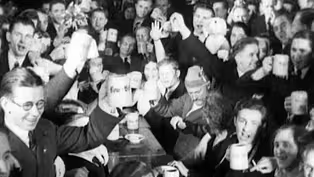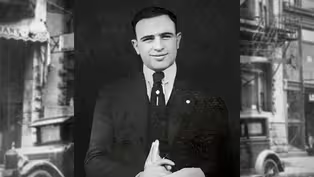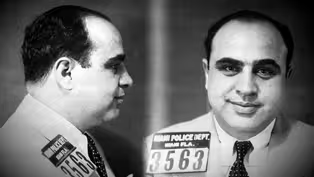Chicago Stories
Extended Interview: Dave Jemilo, Owner of The Green Mill
Clip: 11/1/2024 | 4m 35sVideo has Closed Captions
Dave Jemilo shares the lore behind the famous cocktail bar Al Capone frequented.
Dave Jemilo, owner of The Green Mill, shares the lore behind the famous cocktail bar Al Capone once frequented.
Problems playing video? | Closed Captioning Feedback
Problems playing video? | Closed Captioning Feedback
Chicago Stories is a local public television program presented by WTTW
Lead support for CHICAGO STORIES is provided by The Negaunee Foundation. Major support is provided by the Abra Prentice Foundation, Inc. and the TAWANI Foundation.
Chicago Stories
Extended Interview: Dave Jemilo, Owner of The Green Mill
Clip: 11/1/2024 | 4m 35sVideo has Closed Captions
Dave Jemilo, owner of The Green Mill, shares the lore behind the famous cocktail bar Al Capone once frequented.
Problems playing video? | Closed Captioning Feedback
How to Watch Chicago Stories
Chicago Stories is available to stream on pbs.org and the free PBS App, available on iPhone, Apple TV, Android TV, Android smartphones, Amazon Fire TV, Amazon Fire Tablet, Roku, Samsung Smart TV, and Vizio.
Providing Support for PBS.org
Learn Moreabout PBS online sponsorship(upbeat music) - [Dave] A lot of people come here only because of Capone, but let me tell you how this whole Al Capone thing even started.
I bought the joint in 1986 and there was this old guy that came in here every single day and he sat at that third booth and he had two bottles of Old Style.
He was born in 1900.
The guy told me that Al Capone would be in here, when he was here and he'd be sitting over there.
That's how that happened.
People come here only because of that.
Like we open at 4:00, there'll be people waiting outside, like tourists from Europe or something, and they just come in.
"Oh, Green Mill, Green Mill, where did El Capone sit?"
And the bartender's like, you know, he's just having his first cup of coffee, you know.
And he's like, "ah, geez, he's over there."
We use it as a frame of reference in the joint, like when we're working, you know, I'll see a table that needs drinks, I'll go to the waitress, "Hey, the one next to the Al Capone booth."
First was Pop Morse's Roadhouse from like 1907.
And then the Chamales Brothers bought it 1910 and named it the Green Mill.
Al Capone, you know, he didn't own this joint at all.
Machine Gun Jack McGurn owned part of it who worked for Al Capone.
Capone used to come here because Joe E. Lewis was his favorite entertainer.
That's all true.
Now there's ways of getting outta here if there was a raid.
And you didn't want to go out on the street 'cause guys are looking for you.
So you go behind the bar, you go down the trap door, then there's a series of tunnels you could go out and you could end up down the block, you know, if you knew which way to go.
Did Al Capone have to use any of those?
I don't know.
Historians told me when he would come in, the doors got locked, no one was allowed to leave or come in when he was in here.
(jazz music) So Joe E. Lewis was playing here, I think it was 1927, I'm told he was making $650 a week and he was offered a $1000 a week to go to the Rendezvous Club.
And he told Machine Gun Jack McGurn, "I'm quitting 'cause I got a better offer."
McGurn says, "you can't quit, you have a lifetime contract."
So he went and quit and played over there.
After the first week McGurn's guys get him where he lived at Commonwealth Hotel at Pine Grove and Diversey.
And they roughed him up.
They slash his vocal cords cut off part of his tongue and they left him to die and the guy don't die.
And when Al Capone found out, he said, "why didn't you tell me your beefing with McGurn," you know, and gave him like $10,000 to help him out.
(upbeat music) My dad used to hang out here in the '30s.
He dies in 1984 and I'm dating a girl that we'd go to dive bars in uptown and I go, "let's go to the Green Mill.
My old man used to hang out there."
So we come in here, I fell in love with it.
It was like I'm stepping over drunken guys on the floor.
It was a mess.
I mean it was rough.
And I bought it six months later, I kind of had to do it.
People say, "oh my God, you bought a gold mine?"
No, I didn't buy a gold mine.
I bought a dump and made it a gold mine.
Most of the stuff in here would be late 1920s, somewhere in there.
The only thing I did when I bought the joint was build a big stage and a dance floor back there and then restored everything to make it look like it would have... Well, like it did.
Because I didn't change anything.
You know, if you get a guy that's a 100 years old comes in here that used to be a big shot back in the '40s, he's gonna come in here and say, "this is just like it was in 1940, you know."
And I like that.
I mean, when you get a martini here or a Manhattan in a straight up glass, you get a glass of water 'cause it's not proper to be served a straight up drink without a glass of water.
And if a bartender doesn't do it, I'm all over 'em.
And the waitresses too, they're all rolling their eyes.
I go, "too bad, it's just proper, you know."
We have a band on Tuesday night, it's a hot jazz band, which is music from the '20s and early '30s and they play it authentic to the time and people come in, a lot of 'em dress up like the old style and then they're all dancing to this hot jazz.
That's pretty cool to think that the same thing is going on right now that would've been happening back then.
They're dancing the same way that they danced a 100 years ago.
I get a kick outta that.
(upbeat jazz music)
Video has Closed Captions
Clip: 11/1/2024 | 4m 11s | Al Capone and Johnny Torrio capitalize on Prohibition. (4m 11s)
Video has Closed Captions
Clip: 11/1/2024 | 6m 6s | Al Capone was born in Brooklyn and made his way to Chicago as a young man. (6m 6s)
Video has Closed Captions
Clip: 11/1/2024 | 7m 14s | A tax evasion charge brings down Al Capone. (7m 14s)
Providing Support for PBS.org
Learn Moreabout PBS online sponsorshipSupport for PBS provided by:
Chicago Stories is a local public television program presented by WTTW
Lead support for CHICAGO STORIES is provided by The Negaunee Foundation. Major support is provided by the Abra Prentice Foundation, Inc. and the TAWANI Foundation.


















